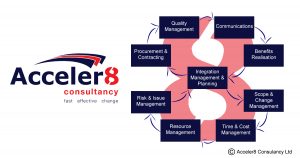The importance of integration management and continuous planning to project success
It’s been reported that business analysis professionals within highly mature organisations spend *83% of their time working and applying business analysis to projects and programmes. In the same report, they researched into how business analysts spend this time. Respondents indicated they spend 31% carrying out needs assessments and business analysis planning, whilst 41% of their time is focused on performing elicitation and analysis.
The question is – how much time should you spend on the different elements of project management?
Definition of project management
Firstly, to answer that we need to answer what is project management. Project Management Institute (PMI) defines this as:
“The application of knowledge, skills and techniques to execute projects effectively and efficiently. It’s a strategic competency for organizations, enabling them to tie project results to business goals — and thus, better compete in their markets.”
 Many organisations have developed their own methodologies which are derivatives of one or more of the standard methodologies. That is to say, even where some organisations may have the same methodology, there is a level of maturity in the way the methodologies are applied. As a result, our simple Project Management Framework© cuts through the varying landscapes. In other words, it is compatible to any methodology and applied to the maturity level that best suits an organisation’s culture.
Many organisations have developed their own methodologies which are derivatives of one or more of the standard methodologies. That is to say, even where some organisations may have the same methodology, there is a level of maturity in the way the methodologies are applied. As a result, our simple Project Management Framework© cuts through the varying landscapes. In other words, it is compatible to any methodology and applied to the maturity level that best suits an organisation’s culture.
What does this cycle tell you?
Above all it shows that throughout a project ‘Integration Management & Planning’ is an integral part of the process, ensuring that planning is always the key focal point and is vital to success. This brings us back to how much time should be spent on different elements of project management. A well-planned project provides **80% of successful product delivery, while the remaining 20% is achieved by effective control and execution. As a result, great planning is therefore a continuous process throughout the project lifecycle and not something was done at the start. The best plans are ones that are ‘living assets’ that continuously get reviewed and updated and therefore remain current, relevant and accurate.
Successful planning results in efficient time management. It avoids time-wasting initiatives such as poor meeting organisation that either overrun allocated time or unnecessary. By avoiding having a meeting for the sake of having a meeting can save valuable time. This allows us to engage critical thinking skills that help to prioritise workloads. This is a valuable aspect of time management and a critical skill for project management that every good project manager must develop.
In addition, plans become particularly effective when everyone involved with the project. They have a clear understanding of their role and recognise what they need to achieve for its success. By continuously keeping plans relevant and roles crystal clear allows for trade-offs among competing objectives. Alternatives can be made in a way that meet or exceed stakeholder needs and expectations. Thereby giving more time to all those involved to focus on the project’s objectives, supporting you in achieving their goals.
________________________________________________________________________________
Want to know more?
At Acceler8 Consultancy our processes are compatible with any methodology. This can be applied to the maturity level that best suits an organisation’s culture. Want to know more? Contact us today.
*Project Management Institute, Inc.







